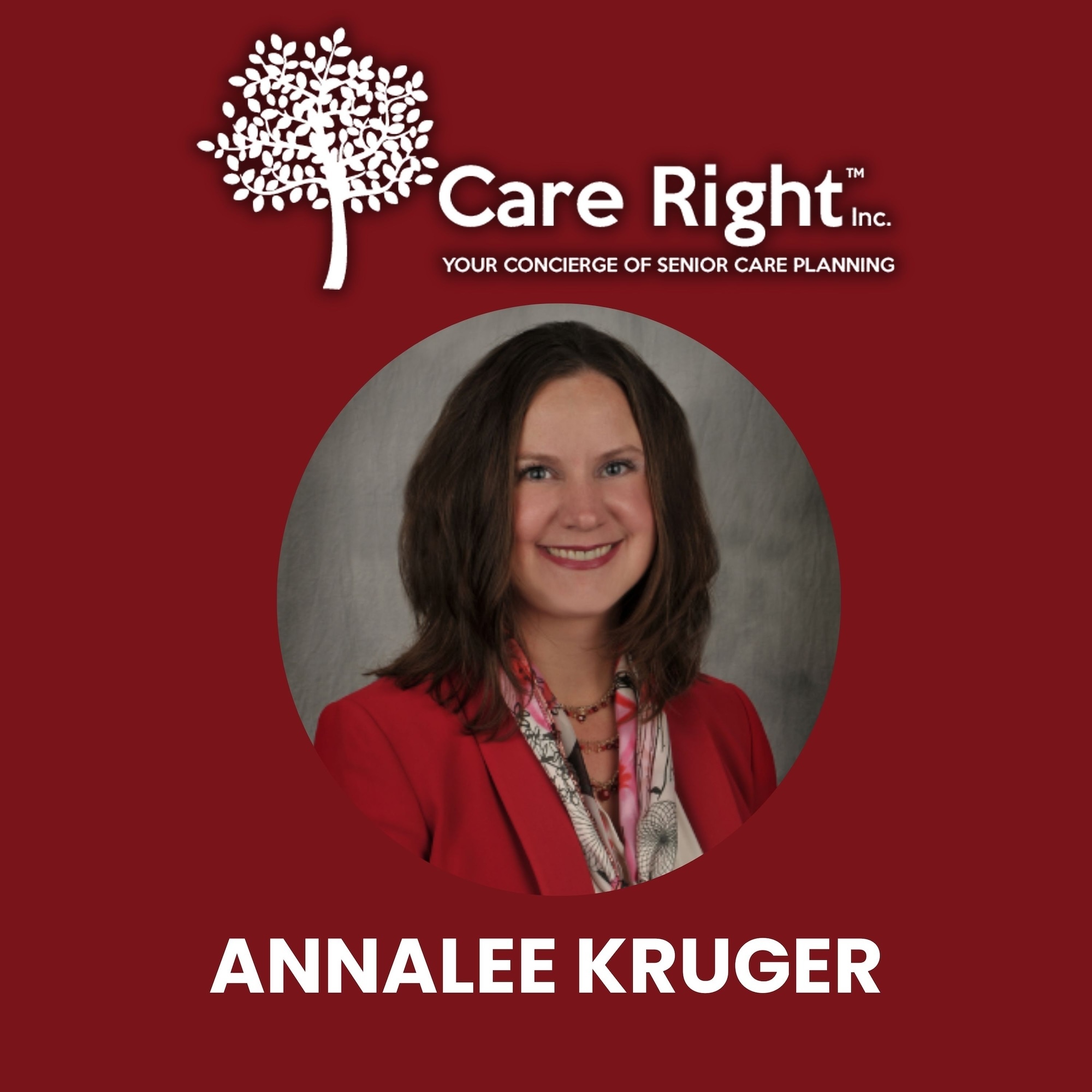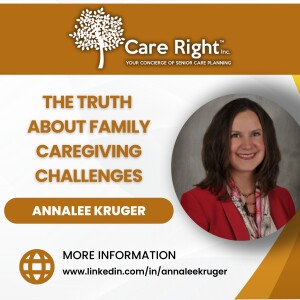
412
Downloads
94
Episodes
Family caregivers across the nation are finding themselves thrust into the role of caring for aging loved ones without ever having any family discussion about the ”what is” of aging. Families are not talking about care needs, caregiver burnout, the costs of care, dementia, other disease progressions, and they aren’t putting proactive plans in place. If you find yourself in this predicament, you need to listen to our ”Tired” podcast series
Episodes

9 hours ago
9 hours ago
Takeaways:
- Merridith leads with heart and connects families to resources.
- Annalee emphasizes the human side of financial planning.
- Families often come to crisis mode without understanding care options.
- Proactive planning is essential to avoid last-minute decisions.
- Understanding dementia is crucial for effective caregiving.
- Families should have regular meetings to discuss aging plans.
- Legal documents should be organized before a crisis occurs.
- Caregiving can have significant financial impacts on adult children.
- Conversations about aging should not be avoided due to fear.
- Resources and support are available for families navigating caregiving.

9 hours ago
9 hours ago
Takeaways:
- Merridith leads with heart and connects families to resources.
- Annalee emphasizes the human side of financial planning.
- Families often come to crisis mode without understanding care options.
- Proactive planning is essential to avoid last-minute decisions.
- Understanding dementia is crucial for effective caregiving.
- Families should have regular meetings to discuss aging plans.
- Legal documents should be organized before a crisis occurs.
- Caregiving can have significant financial impacts on adult children.
- Conversations about aging should not be avoided due to fear.
- Resources and support are available for families navigating caregiving.

Thursday Jul 10, 2025
Navigating Caregiving through Holistic Financial Planning
Thursday Jul 10, 2025
Thursday Jul 10, 2025
Takeaways:
- Caregiving can significantly derail financial plans if not addressed collaboratively.
- Families often underestimate the financial impact of caregiving responsibilities.
- Dementia can lead to long-term care needs that are financially burdensome.
- Caregivers experience emotional and relational stress that can affect their health.
- Proactive planning is essential to navigate unexpected health crises.
- Families should have all legal documents organized and accessible.
- Open communication about aging plans is crucial for family dynamics.
- Financial planners should be aware of the emotional aspects of caregiving.
- Humor and laughter can have significant health benefits.
- Fitness encompasses physical, emotional, intellectual, and spiritual well-being.

Thursday Jul 10, 2025
Navigating Caregiving through Holistic Financial Planning
Thursday Jul 10, 2025
Thursday Jul 10, 2025
- Caregiving can significantly derail financial plans if not addressed collaboratively.
- Families often underestimate the financial impact of caregiving responsibilities.
- Dementia can lead to long-term care needs that are financially burdensome.
- Caregivers experience emotional and relational stress that can affect their health.
- Proactive planning is essential to navigate unexpected health crises.
- Families should have all legal documents organized and accessible.
- Open communication about aging plans is crucial for family dynamics.
- Financial planners should be aware of the emotional aspects of caregiving.
- Humor and laughter can have significant health benefits.
- Fitness encompasses physical, emotional, intellectual, and spiritual well-being.

Wednesday Jun 11, 2025
Navigating the Complexities of Caregiving
Wednesday Jun 11, 2025
Wednesday Jun 11, 2025
In this conversation, Annalee Kruger, owner of Care Right, discusses the complexities of caregiving, particularly for families facing medical crises. She emphasizes the importance of having proactive conversations about aging, the need for comprehensive aging plans, and the role of family dynamics in caregiving. Annalee also introduces tools like the care matrix and the e-Grab and Go checklist to help families navigate senior care options effectively. The discussion highlights the emotional and logistical challenges families face and the support Care Right offers to alleviate these burdens.

Tuesday Jun 03, 2025
Navigating the Complexities of Caregiving
Tuesday Jun 03, 2025
Tuesday Jun 03, 2025
In this conversation, Annalee Kruger, owner of Care Right, discusses the complexities of caregiving, particularly for families facing medical crises. She emphasizes the importance of having proactive conversations about aging, the need for comprehensive aging plans, and the role of family dynamics in caregiving. Annalee also introduces tools like the care matrix and the e-Grab and Go checklist to help families navigate senior care options effectively. The discussion highlights the emotional and logistical challenges families face and the support Care Right offers to alleviate these burdens.

Monday Nov 04, 2024
The Truth About Family Caregiving Challenges
Monday Nov 04, 2024
Monday Nov 04, 2024
In this Facebook Live session, Annalee Kruger, founder of Care Right, Inc., shares her insights into family caregiving and the common struggles faced by adult children thrust into these roles. Drawing on over 22 years of experience as a social worker, family mediator, and former retirement community Executive Director, Annalee explains why families often find themselves unprepared for caregiving responsibilities.
Why Family Meetings Matter
Annalee emphasizes the importance of family meetings to address long-term care planning before crises arise. She discusses how lack of preparation can lead to financial strain, emotional stress, and family discord. Annalee highlights that 58% of adult children become family caregivers without prior discussions about their parents’ needs, creating a stressful environment that affects everyone involved.
Understanding Dementia and Caregiving Realities
With a focus on dementia and aging, Annalee offers a realistic view of caregiving challenges, including the emotional and financial toll it can take on families. She explains how misconceptions about Medicare and long-term care insurance often leave families scrambling for solutions. Annalee provides insights into common caregiving myths and how adult children can better understand the progression of dementia to support their parents’ evolving needs.
Managing Family Dynamics in Crisis Situations
As a family mediator, Annalee often assists families in navigating conflicts that arise during caregiving. She highlights that strained relationships and a lack of family cohesion can worsen the caregiving experience. Annalee shares how her consultancy provides neutral facilitation to help families work together, even when siblings or family members are not aligned in their views.
Virtual Solutions for a Modern Problem
Recognizing that many families live far apart, Annalee explains why she established Care Right as a virtual service. She discusses how her company uses technology to provide caregiving support across different states and time zones, helping families coordinate care even when separated by distance.
Key Takeaways from This Episode
- Preparation is Crucial: Early family meetings and discussions about aging plans can significantly reduce stress during crisis situations.
- Understanding Dementia: Knowing the progression and challenges of dementia helps families make informed caregiving decisions.
- Managing Family Relationships: Neutral facilitation can be invaluable when family dynamics add stress to caregiving responsibilities.
- Virtual Solutions for Modern Families: Virtual consulting offers practical support to families who live far from each other, bridging the gap for coordinated caregiving.
Learn More About Care Right, Inc.
To learn more about Annalee’s work and how Care Right, Inc. can support your family’s caregiving journey, visit carerightinc.com. Annalee and her team provide virtual consultation services across the country, offering guidance on everything from family mediation to dementia care planning.
Thank you for tuning in to this insightful session!

Friday Oct 18, 2024
The ABCs of Elder Care for Financial Professionals
Friday Oct 18, 2024
Friday Oct 18, 2024
It's a tough situation when medical emergencies and caregiving demands come up unexpectedly. Many families find themselves scrambling to figure out not just the logistics of care but also how to emotionally support one another during such stressful times. Financial advisors can play a crucial role in helping families prepare by discussing potential costs and setting up plans for these situations, but there’s often still a gap in emotional preparedness. Having a solid support system and open communication can really help families navigate those complexities together when they arise.
Annalee Kruger, of Care Right Inc., joins Dominique Henderson on the Conversations for Financial Professionals podcast as she delves into the pressing need for incorporating aging and caregiving considerations into financial planning, highlighting how unprepared families often find themselves when crises hit. She emphasizes the broad scope of caregiving, which encompasses far more than medical support and extends to informal tasks that accumulate over time. Stay tuned!
Quotes:
- “The pandemic has made families more aware that, hey, we have to put a plan together because they can't get in to see their loved ones." - Annalee Kruger
- “Aging planning is not just having a financial plan; it's about anticipating the realities of caregiving and managing family dynamics.” - Annalee Kruger
- “The reality is, financial plans don’t mean much if families are blindsided by a medical crisis they weren’t prepared for.” - Annalee Kruger
Takeaways:
-
Initiate Conversations Early: Start discussing potential aging and caregiving needs with your clients before crises occur. Encourage clients to consider who will care for them, how care will be managed, and what resources are available to support them."
-
Build a Comprehensive Professional Network: As a financial professional, expand your network to include social workers, geriatric consultants, and other elder care specialists. This will allow you to offer holistic support to clients navigating aging-related issues.
-
Prioritize Relationship Building: Focus on developing deep, meaningful relationships with clients. Ask empathetic questions about their personal lives and caregiving roles to better understand and assist with their comprehensive planning needs.
Conclusion:
Proactive aging and caregiving planning is essential to address the challenges and emotional dynamics that come with these responsibilities. Families face a range of complexities, from managing health concerns to navigating financial issues, making it crucial to plan ahead. By taking the time to prepare, families can reduce stress and ensure their loved ones receive the care they need. This forward-thinking approach not only provides peace of mind but also strengthens family bonds during difficult times.
Resources:

Friday Oct 18, 2024
A Road Map for Your Aging Plan
Friday Oct 18, 2024
Friday Oct 18, 2024
Thinking about aging and its impact on families is definitely important. It’s a good idea to have open conversations about expectations, health care, and what support might be needed down the line. Planning ahead, whether that means discussing living arrangements or financial aspects, can really ease some of the stress that comes with these changes.
Annalee Kruger, of Care Right Inc., joins Mark Turnbull on the Aging Today podcast to discuss the pressing need for proactive aging plans. Many families find themselves in crisis mode because they haven't anticipated the complexities of caring for aging loved ones. They face challenges like escalating care costs, emotional strain, and feelings of unpreparedness. Stay tuned!
Quotes:
- “Denial is a great place to be until you can't be there anymore; the time to plan is now." - Annalee Kruger
- “Every senior’s goal is to age in place at home, but only about 7% of seniors actually get to do that; we must have a plan B.” - Annalee Kruger
- “The decisions you make today about your aging loved ones affect future care options and possibilities.” - Annalee Kruger
Takeaways:
-
Initiate Proactive Family Discussions: Begin open conversations with your family about aging preferences and plans. Ask yourself and your loved ones, "What are our goals as we age, and how can we best prepare to achieve them?"
-
Develop and Implement an Aging Plan: Craft a detailed aging plan that addresses current and future needs, incorporating healthcare directives, financial planning, and preferred care settings. Revisit and update this plan regularly as circumstances evolve.
-
Educate Yourself on Healthcare Options and Costs: Research and understand the different long-term care options available, such as in-home care, assisted living, and nursing homes, as well as the associated costs. This knowledge will empower you to make informed decisions when the time comes.
Conclusion:
Planning ahead for aging is crucial to avoid the emotional and financial pitfalls that often accompany unexpected crises. Understanding the variety and costs of care options empowers families to make informed decisions that align with their goals and resources. By facilitating open communication and creating a comprehensive plan, family dynamics and relationships can be preserved, ensuring a smoother transition through the different stages of aging.
Resources:

Friday Oct 18, 2024
Aging Plans and Family Care: What You Need to Know
Friday Oct 18, 2024
Friday Oct 18, 2024
Aging is a natural part of life, but the complexities that come with it can surprise even the most prepared families. Many people expect certain challenges, but unexpected issues can arise that make caregiving difficult. This can include managing health changes, navigating medical systems, and handling emotional needs. Even families who have planned ahead may find themselves unprepared for the day-to-day realities of aging. Understanding that these complexities can happen helps families adapt and find support when they need it most.
Annalee Kruger, of Care Right Inc., once again joins Chris Boyd on the Something More podcast to offer a compelling insight into the myriad challenges and emotions unfurling behind closed doors of families caught off guard by the aging process. She highlights the recurring dilemma—families failing to plan ahead. As healthcare systems struggle and families become geographically dispersed, are we overlooking the warning signs our loved ones display as they age? Stay tuned!
Quotes:
- “Families are always blindsided; they don't know what to ask or where to start when it comes to aging care." - Annalee Kruger
- “If you don't invest the energy and resources in maintaining family relationships, they drift apart, leaving everyone unprepared in a crisis.” - Annalee Kruger
- “Caregiving should not derail your career or financial stability; planning is essential to prevent such burnout.” - Annalee Kruger
Takeaways:
-
Initiate Conversations About Aging Plans: Schedule a family meeting to discuss aging plans with your loved ones. Explore their preferences for care and living arrangements, and discuss potential solutions for foreseeable challenges.
-
Evaluate and Update Legal Documents: Review and ensure that all necessary legal documents such as living wills, powers of attorney, and advance directives are up-to-date, signed, and accessible. This should be a priority to ensure smooth decision-making in times of need.
-
Educate Yourself on Care Options: Spend time researching the various types of elder care available in your area. Understand the differences in services provided by assisted living, nursing homes, and in-home care, and learn about their respective costs and availability.
Conclusion:
A well-structured plan can significantly alleviate common stressors that families encounter, such as caregiver burnout and unexpected financial burdens. By proactively addressing these challenges, families can create a supportive environment that prioritizes both emotional and financial well-being. This preparation helps caregivers manage their responsibilities without becoming overwhelmed, ensuring they can provide the best care possible. Ultimately, having a clear plan fosters resilience and peace of mind, allowing families to navigate difficult times with greater ease and confidence.
